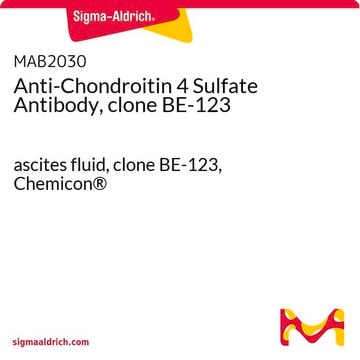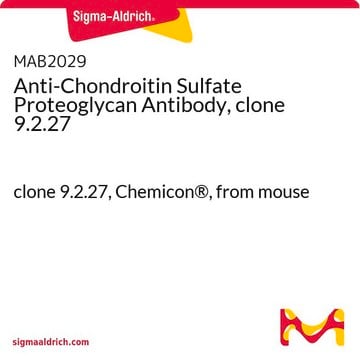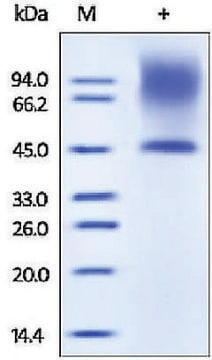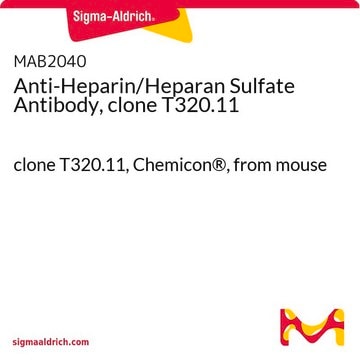SAB4200696
Anti-Chondroitin Sulfate antibody, Mouse monoclonal
clone CS-56, purified from hybridoma cell culture
Synonyme(s) :
CSPG, chondroitin sulfate proteoglycan
About This Item
Produits recommandés
Source biologique
mouse
Niveau de qualité
Forme d'anticorps
purified from hybridoma cell culture
purified immunoglobulin
Type de produit anticorps
primary antibodies
Clone
CS-56, monoclonal
Forme
buffered aqueous solution
Espèces réactives
mouse, chicken, bovine, human
Conditionnement
antibody small pack of 25 μL
Concentration
~1 mg/mL
Technique(s)
immunofluorescence: 2.5-5 μg/mL using bovine BMGE cells
immunohistochemistry: 2.5-5 μg/mL using heat-retrieved formalin-fixed, paraffin-embedded human colon cancer sections and Biotin/ExtrAvidin ®-Peroxidase staining system.
Isotype
IgM
Conditions d'expédition
dry ice
Température de stockage
−20°C
Modification post-traductionnelle de la cible
unmodified
Informations sur le gène
human ... CSPG4(1464)
Description générale
Chondroitin sulfate proteoglycan 4 (CSPG4) or nerve/glial antigen 2 (NG2) is encoded by the gene mapped to human chromosome 15q24.2-15q24.3. It is a growth-inhibitory chondroitin sulfate proteoglycan (CSPG) produced after spinal cord injury. It has a single glycosaminoglycan (GAG) chain. The protein belongs to the transmembrane chondroitin sulfate proteoglycans family.
Immunogène
Actions biochimiques/physiologiques
Forme physique
Stockage et stabilité
Autres remarques
Informations légales
Clause de non-responsabilité
Vous ne trouvez pas le bon produit ?
Essayez notre Outil de sélection de produits.
Code de la classe de stockage
12 - Non Combustible Liquids
Classe de danger pour l'eau (WGK)
WGK 1
Point d'éclair (°F)
Not applicable
Point d'éclair (°C)
Not applicable
Faites votre choix parmi les versions les plus récentes :
Certificats d'analyse (COA)
Vous ne trouvez pas la bonne version ?
Si vous avez besoin d'une version particulière, vous pouvez rechercher un certificat spécifique par le numéro de lot.
Déjà en possession de ce produit ?
Retrouvez la documentation relative aux produits que vous avez récemment achetés dans la Bibliothèque de documents.
Les clients ont également consulté
Therapeutic Target in Malignant Cancer
Notre équipe de scientifiques dispose d'une expérience dans tous les secteurs de la recherche, notamment en sciences de la vie, science des matériaux, synthèse chimique, chromatographie, analyse et dans de nombreux autres domaines..
Contacter notre Service technique















